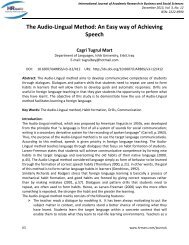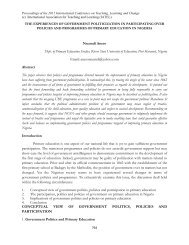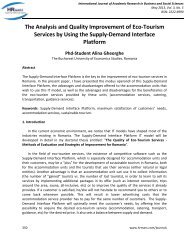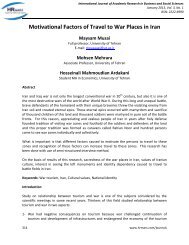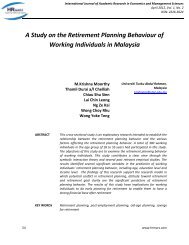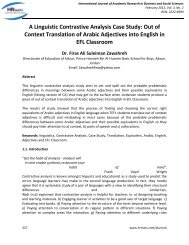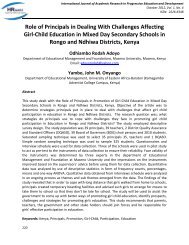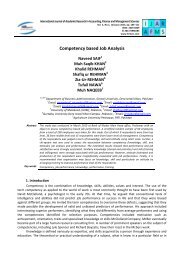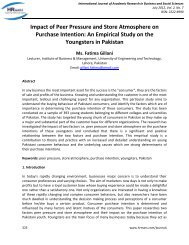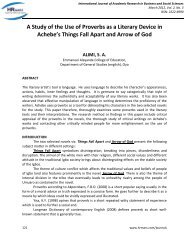Democratization and Development in Nigeria: The Fourth Republic ...
Democratization and Development in Nigeria: The Fourth Republic ...
Democratization and Development in Nigeria: The Fourth Republic ...
Create successful ePaper yourself
Turn your PDF publications into a flip-book with our unique Google optimized e-Paper software.
International Journal of Academic Research <strong>in</strong> Economics <strong>and</strong> Management Sciences<br />
September 2012, Vol. 1, No. 5<br />
ISSN: 2226-3624<br />
<strong>Democratization</strong> <strong>and</strong> <strong>Development</strong> <strong>in</strong> <strong>Nigeria</strong>: <strong>The</strong><br />
<strong>Fourth</strong> <strong>Republic</strong> <strong>in</strong> Perspective<br />
Majekodunmi, Aderonke<br />
Department Of Political Science, Faculty Of Social Science, University Of Lagos, Akoka-Yaba,<br />
<strong>Nigeria</strong><br />
Abstract<br />
<strong>Nigeria</strong>’s present democratization, which culm<strong>in</strong>ated <strong>in</strong> the country’s <strong>Fourth</strong> <strong>Republic</strong> on May<br />
29, 1999, started amidst great hope <strong>and</strong> expectations. S<strong>in</strong>ce then, the nature of the democratic<br />
project has been the subject of debate <strong>in</strong> various circles. This paper is a contribution to the<br />
debate on democratization <strong>and</strong> development <strong>in</strong> <strong>Nigeria</strong>. It exam<strong>in</strong>es the nexus among the<br />
'embattled duo,' us<strong>in</strong>g a contextual analysis of the <strong>Nigeria</strong>n experience under the fourth<br />
republic. It argues that whereas democratization, def<strong>in</strong>ed as the process of transition to a<br />
stable/consolidated democracy, could be a harb<strong>in</strong>ger of development. <strong>The</strong> paper notes that the<br />
present state of democratization <strong>in</strong> <strong>Nigeria</strong> gives cause for concern, as it tends towards the<br />
direction of disempowerment. While democratization has been on course <strong>Nigeria</strong>, it has not<br />
taken a firm root, because it has so far been pursued <strong>and</strong> predicated on alien <strong>in</strong>stitutions. Given<br />
this scenario, the paper suggests that there is an urgent need for a reversal of the trend, if<br />
democratization must be genu<strong>in</strong>ely nurtured <strong>and</strong> susta<strong>in</strong>ed <strong>in</strong> <strong>Nigeria</strong>. <strong>The</strong> paper concludes that<br />
address<strong>in</strong>g the problem of democratization <strong>and</strong> development must <strong>in</strong>volve all the stakeholders.<br />
This is a major step towards stabiliz<strong>in</strong>g <strong>and</strong> entrench<strong>in</strong>g democracy <strong>in</strong> <strong>Nigeria</strong>.<br />
Introduction<br />
Democracy is a vital <strong>in</strong>strument that propels political proficiency, economic development <strong>and</strong><br />
social stability of any nation state. Democracy <strong>in</strong> <strong>Nigeria</strong> has been a mere political desideratum<br />
hang<strong>in</strong>g on a limp<strong>in</strong>g utopia (Adewusi, 2011). A true democracy is a s<strong>in</strong>e qua non for the<br />
development of all sectors of any country’s economy. As observed by Nwanolue <strong>and</strong> Ojukwu<br />
(2012), the general success of any practic<strong>in</strong>g democracy is deeply <strong>in</strong>cumbent upon three major<br />
challenges. First, the challenge of legislative efficiency, <strong>in</strong> which the activities of the national<br />
assembly ought to reflect <strong>and</strong> reform positively the socio-economic <strong>and</strong> political lacuna that has<br />
evaded the country for some reasonable length of while. Second, is the challenge of the<br />
executive <strong>and</strong> management of the nation’s economy. Lastly, the will<strong>in</strong>gness of the legislative<br />
powers that be, to grant much reverenced policy of <strong>in</strong>clusiveness to the hoi polloi to participate<br />
vibrantly <strong>in</strong> the daily governance of the country (Mamudu & Hassan, 2011).<br />
Regrettably, the practice of the so-called democracy <strong>in</strong> the 21st Century <strong>Nigeria</strong> is <strong>in</strong>tr<strong>in</strong>sically<br />
characterized by political <strong>in</strong>stability, social acabre, cultural balderdash <strong>and</strong> economic quagmire,<br />
result<strong>in</strong>g <strong>in</strong> unemployment of all forms, lead<strong>in</strong>g to abject hunger <strong>and</strong> <strong>in</strong>describable poverty. <strong>The</strong><br />
attendant implication of this misnomer are practical existence of all manner of crimes such as<br />
62 www.hrmars.com
International Journal of Academic Research <strong>in</strong> Economics <strong>and</strong> Management Sciences<br />
September 2012, Vol. 1, No. 5<br />
ISSN: 2226-3624<br />
kidnapp<strong>in</strong>g, armed robbery, prostitution, sexual slavery, pen-robbery, <strong>and</strong> electioneer<strong>in</strong>g<br />
bicker<strong>in</strong>g <strong>and</strong> hooliganism (Nwanolue <strong>and</strong> Ojukwu, 2012).<br />
Stemm<strong>in</strong>g from the forego<strong>in</strong>g, the pr<strong>in</strong>cipal objective of this paper is to assess the state of<br />
democratization vis-à-vis development <strong>in</strong> <strong>Nigeria</strong>.<br />
Conceptual Framework<br />
<strong>The</strong> conceptual ambivalence, as well as confusions, that hover around democratization <strong>and</strong><br />
development could be attributed to the fact that, all seems to be, though <strong>in</strong> vary<strong>in</strong>g degrees,<br />
multidimensional <strong>and</strong> value loaded (Omotola, 2007).<br />
<strong>The</strong> issue of democratization has been the most topical <strong>in</strong> recent times as regards <strong>Nigeria</strong>’s<br />
development. <strong>Democratization</strong> simply connotes the process of <strong>in</strong>stall<strong>in</strong>g a democratic system of<br />
adm<strong>in</strong>istration. This, of course, <strong>in</strong>volves an enhancement of the social condition necessary for<br />
the facilitation of a democratization process, characterized by a robust political atmosphere<br />
which ultimately engenders socio-economic <strong>and</strong> socio-cultural development of society. A<br />
democratic system of government is that political system <strong>in</strong> which everybody has equal<br />
opportunity to participate <strong>in</strong> the political process <strong>in</strong> whatever capacity that is deemed fit. A<br />
government, <strong>in</strong> this regard, derives its authority from the people who, <strong>in</strong> essence, choose those<br />
<strong>in</strong> government. An important feature of this system is the supremacy of the national or<br />
common <strong>in</strong>terest, which must supersede personal <strong>in</strong>terest (Ibagere <strong>and</strong> Omoera, 2010).<br />
Gunther et al. (1995) contend that the democratization process has three phases: the fall of the<br />
authoritarian regime, consolidation, <strong>and</strong> endur<strong>in</strong>g democracy. Obviously, the forego<strong>in</strong>g op<strong>in</strong>ion<br />
<strong>and</strong> similar others do not specify a time frame for the actualization of the three highlighted<br />
phases. It, therefore, means that the peculiarities <strong>in</strong> each system would play a profound role <strong>in</strong><br />
the process of actualization. In the case of <strong>Nigeria</strong>, the slow pace of the process raises doubt <strong>in</strong><br />
the m<strong>in</strong>ds of the generality of the people who, for <strong>in</strong>stance, are confounded as to why such<br />
basic aspects of democracy as elections <strong>and</strong> legislative duties still lack significant purposiveness,<br />
twelve years after the <strong>Fourth</strong> <strong>Republic</strong> commenced.<br />
Basically, democratization connotes a process of movement from authoritarianism to a stable<br />
democracy. <strong>Democratization</strong> is the process of establish<strong>in</strong>g, strengthen<strong>in</strong>g, or extend<strong>in</strong>g the<br />
pr<strong>in</strong>ciples, mechanism, <strong>and</strong> <strong>in</strong>stitutions that def<strong>in</strong>e a democratic regime (Osaghae, 1999). In his<br />
elaboration on this def<strong>in</strong>ition, Osaghae op<strong>in</strong>es that two po<strong>in</strong>ts could be <strong>in</strong>ferred. One, that<br />
democratization is relative, <strong>in</strong>cremental <strong>and</strong> phased. Two, that democratization is variegated <strong>in</strong><br />
nature, call<strong>in</strong>g for caution not to analyze it as a blanket process. It was Osaghae (1995), who<br />
equates democratization with transition to democracy, he expla<strong>in</strong>s it as a political process<br />
because it basically has to do with the transformation of the state <strong>and</strong> the political society.<br />
Golden, (2010), therefore conceptualizes democracy to <strong>in</strong>corporate the exploitative <strong>and</strong><br />
alliterative tendencies often demonstrated by the capitalists aga<strong>in</strong>st the downtrodden.<br />
Accord<strong>in</strong>g to him, democracy, empirically speak<strong>in</strong>g could mean a socio-economic <strong>and</strong> political<br />
formation that grants the hoi polloi the irreducible <strong>in</strong>strument of determ<strong>in</strong><strong>in</strong>g <strong>and</strong> participat<strong>in</strong>g<br />
63 www.hrmars.com
International Journal of Academic Research <strong>in</strong> Economics <strong>and</strong> Management Sciences<br />
September 2012, Vol. 1, No. 5<br />
ISSN: 2226-3624<br />
effectively <strong>in</strong> the day-to-day smooth governance of their country. That is, the general<br />
transformative <strong>and</strong> re-structur<strong>in</strong>g powers of that state are vested <strong>in</strong> the h<strong>and</strong>s of the<br />
electorates.<br />
Yahaya (2007) sees democratization as both a procedural <strong>and</strong> <strong>in</strong>stitutional aspect of liberaliz<strong>in</strong>g<br />
a previously authoritarian political environment. It would consist of open<strong>in</strong>g up a previously<br />
closed authoritarian political system <strong>and</strong> deepen<strong>in</strong>g <strong>and</strong> exp<strong>and</strong><strong>in</strong>g of values thought to be<br />
necessary for the entrenchment <strong>and</strong> sustenance of democracy. In essence, it is about the<br />
construction of a system that allows for the bulk of the populace to participate <strong>in</strong> the decision<br />
mak<strong>in</strong>g process that has direct bear<strong>in</strong>gs upon their lives.<br />
In his own view Potter (2000:368) conceptualised democratization thus:<br />
a political movement from less accountable to more accountable government, from<br />
less competitive (or non-existent) elections to fuller <strong>and</strong> fairer predicted civil <strong>and</strong><br />
political rights, from weak (or non-existent) autonomous associations to more<br />
numerous associations <strong>in</strong> civil society.<br />
Nwabueze (1993) conceives democratization as not just concerned with the form of<br />
government known as democracy nor be<strong>in</strong>g synonymous with multi-partyism, but as a process<br />
of experimentation dur<strong>in</strong>g which certa<strong>in</strong> basic conditions have to be put <strong>in</strong> place. He also makes<br />
many salient po<strong>in</strong>ts about democratization. First, is that the list<strong>in</strong>g of th<strong>in</strong>gs required by<br />
democratization does not carry the implication of preconditions or prerequisites without which<br />
democratization cannot, <strong>and</strong> must not, be embarked upon <strong>and</strong> that they can be created or<br />
developed <strong>in</strong> the process of experimentation. Second is that the <strong>in</strong>fus<strong>in</strong>g of the spirit of liberty,<br />
democracy, justice, the rule of law, <strong>and</strong> the order among the people rema<strong>in</strong>s the most crucial to<br />
democratization.<br />
Onyeoziri (1989) argued that democratization needed to be situated with<strong>in</strong> the follow<strong>in</strong>g poles:<br />
1) <strong>The</strong> doma<strong>in</strong> of <strong>in</strong>dividual <strong>and</strong> group rights <strong>and</strong> freedoms;<br />
2) <strong>The</strong> doma<strong>in</strong> of popular <strong>and</strong> equal participation <strong>in</strong> collective decision;<br />
3) <strong>The</strong> dimensions of accountability of government to mass publics <strong>and</strong> constituent<br />
m<strong>in</strong>orities; <strong>and</strong><br />
4) <strong>The</strong> dimension of the application of the pr<strong>in</strong>ciples of equal citizenship <strong>in</strong> all spheres of<br />
life - social, economic <strong>and</strong> political.<br />
He further op<strong>in</strong>ed that a system that recognizes more of these rights has democratized more<br />
than one that recognizes only few of these rights (Onyeoziri, 1989).<br />
<strong>Democratization</strong> is more appropriately viewed as the <strong>in</strong>stitutionalization of democratic<br />
pr<strong>in</strong>ciples as part of everyday culture <strong>in</strong> a society. It f<strong>in</strong>ds expression <strong>in</strong> the channel<strong>in</strong>g of<br />
behavioral patterns towards democratic ideals. It permeates all facets of community life from<br />
religion through the economy, marriage family to politics. <strong>The</strong>se <strong>in</strong>stitutions legitimize the<br />
activities of those who exercise authority. If these <strong>in</strong>stitutions are absent militarism might be<br />
misconstrued for democratization (Ifeanacho <strong>and</strong> Nwagwu, 2009).<br />
64 www.hrmars.com
International Journal of Academic Research <strong>in</strong> Economics <strong>and</strong> Management Sciences<br />
September 2012, Vol. 1, No. 5<br />
ISSN: 2226-3624<br />
Be that as it may, it should be noted that democratization has generally been seen as the<br />
solution to <strong>Nigeria</strong>'s multifaceted problems. This is what Ottaway (1995) called the 'democratic<br />
solution', which he considers as "certa<strong>in</strong>ly the most desirable <strong>and</strong> probably the only viable one<br />
<strong>in</strong> the long run". <strong>The</strong> validity of this claim only rema<strong>in</strong>s to be supported by empirical realities<br />
across the cont<strong>in</strong>ent. May be a little more time is needed before a comprehensive assessment<br />
could be undertaken. Yet, a prelim<strong>in</strong>ary evaluation is desirable (Omotola, 2007).<br />
From the above explanations, it is important to state that democratization is a process that<br />
takes place over a period of time <strong>and</strong> that <strong>in</strong> the process of democratization, the state <strong>and</strong> the<br />
general populace are the major actors who must show commitment to the whole process of<br />
try<strong>in</strong>g to allow democracy to take a strong hold of the entire society.<br />
<strong>Development</strong> on the other h<strong>and</strong>, is a problematic concept. It has been one of the most<br />
ambiguous terms <strong>in</strong> social sciences discourse <strong>and</strong> it cont<strong>in</strong>ues to generate debate among<br />
various scholars.<br />
In general terms, however, development has been viewed from political, economic <strong>and</strong> social<br />
dimensions. Sen (1990) offered illum<strong>in</strong>at<strong>in</strong>g thoughts on the concept of development. For him,<br />
development connotes 'capacity expansion'. As capacity expansion, development requires<br />
adequate empowerment of the state <strong>and</strong> the society such that they can adequately distil their<br />
complimentary responsibilities. It requires an enhanced state capacity as well as <strong>in</strong>stitutional<br />
<strong>and</strong> governmental stability. It is only with<strong>in</strong> such framework that <strong>in</strong>dividual members of the<br />
society can f<strong>in</strong>d fulfillment <strong>in</strong> terms of the basic necessities of life. As freedom, development<br />
dem<strong>and</strong>s great latitude of autonomy for the political community <strong>and</strong> its constituent parts; as<br />
well as for the <strong>in</strong>dividual members of such communities.<br />
Todaro (1989) conceptualizes development as a multidimensional process <strong>in</strong>volv<strong>in</strong>g major<br />
changes <strong>in</strong> social structures, popular attitudes, <strong>and</strong> national <strong>in</strong>stitutions, as well as the<br />
acceleration of economic growth, the reduction of <strong>in</strong>equality <strong>and</strong> the eradication of absolute<br />
poverty. Rodney (1972) sees beyond the <strong>in</strong>dividual or people’s perception of development <strong>and</strong><br />
conceived development whether economic, political or social to imply both <strong>in</strong>crease <strong>in</strong> output<br />
<strong>and</strong> changes <strong>in</strong> the technical <strong>and</strong> <strong>in</strong>stitutional arrangement by which it is produced. In other<br />
words <strong>and</strong> more importantly, development is a multi-dimensional concept <strong>and</strong> <strong>in</strong> spite of the<br />
various conceptions, development is basically about the process of changes which lies around<br />
the spheres of societal life<br />
With<strong>in</strong> the context of this paper, the term ‘development’ is a conscious acceleration of<br />
economic, political, social, educational <strong>and</strong> technological growth of <strong>Nigeria</strong> through effect<strong>in</strong>g,<br />
consistent, progressive <strong>and</strong> endur<strong>in</strong>g policies of the government. It is conceived <strong>in</strong> this paper<br />
that such effective policies of government that are capable of effective progressive<br />
development <strong>in</strong> all spheres of our national life must curiously evolve from a truly democratic<br />
political system <strong>in</strong> which adequate value is placed on protection <strong>and</strong> promotion of human rights<br />
<strong>and</strong> fundamental freedoms. It is also believed <strong>in</strong> this paper that the overall development of<br />
65 www.hrmars.com
International Journal of Academic Research <strong>in</strong> Economics <strong>and</strong> Management Sciences<br />
September 2012, Vol. 1, No. 5<br />
ISSN: 2226-3624<br />
<strong>Nigeria</strong> cannot be realized <strong>in</strong> an environment which is characterized by lack of respect for<br />
democratic process <strong>and</strong> fundamental rights of citizens.<br />
<strong>The</strong> Nexus Of <strong>Democratization</strong> And <strong>Development</strong><br />
<strong>The</strong> <strong>in</strong>terface between democratization <strong>and</strong> development has long engaged the susta<strong>in</strong>ed<br />
<strong>in</strong>terest of scholars <strong>and</strong> researchers across the globe. However, much as it has generated<br />
enormous <strong>in</strong>terest, no universal evidence seems to be shared that one is more important than<br />
the other. <strong>The</strong> debate on the relationship between democracy <strong>and</strong> development has equally<br />
been on the front burner of scholarly discourse over the years. <strong>The</strong> debate therefore rema<strong>in</strong>s<br />
one of the hotly debated issues, today as yesterday; <strong>and</strong> may cont<strong>in</strong>ue to be (Omotola, 2006).<br />
No wonder, Feng (2001) noted that, “Democracy <strong>and</strong> <strong>Development</strong> rema<strong>in</strong>s one of the most<br />
important topics – perhaps even the s<strong>in</strong>gle most important <strong>in</strong> the field of <strong>in</strong>ternational <strong>and</strong><br />
comparative political economy for years to come”.<br />
<strong>The</strong>se debates were aptly summarized by Olufemi (2000) thus, one school of thought argued<br />
that democracy was unrealizable And unsusta<strong>in</strong>able without a requisite dose of economic<br />
development.<br />
<strong>Democratization</strong> <strong>and</strong> development share certa<strong>in</strong> basic virtues such as popular participation,<br />
capacity expansion as well as freedom (Mazrui, 2002). <strong>Democratization</strong> is an <strong>in</strong>dependent<br />
variable that expla<strong>in</strong>s the level of economic development of any society. As observed by<br />
Osaghae (1995), it is important to emphasize the po<strong>in</strong>t that while democratization may<br />
engender development, much of it depends to some extent on the context with<strong>in</strong> which the<br />
analysis is carried out. Moreover, the impact of democratization on development could be a<br />
reflection of its time-spell as well as the depth of the democratization process itself. It could<br />
also be a spectral, especially <strong>in</strong> the short run, giv<strong>in</strong>g the fact that development is a<br />
multidimensional concept. <strong>Development</strong> <strong>in</strong> a given aspect, say for example at the political level,<br />
may <strong>in</strong> the long run <strong>in</strong>duce development <strong>in</strong> other aspects. That be<strong>in</strong>g the case, caution must be<br />
exercised <strong>in</strong> mak<strong>in</strong>g generalized statements about their relationship. This expla<strong>in</strong>s why a<br />
contextual analysis would be of high utility hav<strong>in</strong>g been reputed for its ability to account for<br />
differences <strong>in</strong> the same phenomenon <strong>in</strong> different systems.<br />
<strong>The</strong> idea of popular participation as noted by Adedeji (1997) is crucial to both democratization<br />
<strong>and</strong> development. In its comprehensive usage, popular participation is the empowerment of<br />
the people to <strong>in</strong>volve themselves <strong>in</strong> the regulat<strong>in</strong>g structures <strong>and</strong> <strong>in</strong> design<strong>in</strong>g policies <strong>and</strong><br />
program that serve the <strong>in</strong>terest of all, <strong>and</strong> contribute optimally to the development process.<br />
This prompted Zack-Williams (2001) to conclude that “no democracy, no development”.<br />
Accord<strong>in</strong>g to him, an essential weapon of democracy that makes it a requisite for economic<br />
development is that democracy empowers the general population to control decision-mak<strong>in</strong>g.<br />
As such, the governed are presumed to have all it takes to hold governments accountable by<br />
<strong>in</strong>sist<strong>in</strong>g on transparency, openness <strong>and</strong> other measures of control. <strong>The</strong> absence of these<br />
virtues is considered as very <strong>in</strong>imical to the pursuit of economic development. Democracy<br />
66 www.hrmars.com
International Journal of Academic Research <strong>in</strong> Economics <strong>and</strong> Management Sciences<br />
September 2012, Vol. 1, No. 5<br />
ISSN: 2226-3624<br />
accord<strong>in</strong>g to this school has been found to facilitate economic development with little or no<br />
political or social exaction from the people.<br />
Issues In <strong>Democratization</strong> And <strong>Development</strong> In <strong>Nigeria</strong><br />
<strong>Nigeria</strong>'s march to constitutional civilian rule has so far been a tortuous adventure,<br />
characterized by moments of hope raised <strong>and</strong> hope dashed. <strong>The</strong> democratization processes<br />
that ushered <strong>in</strong> the fledg<strong>in</strong>g fourth republic were particularly daunt<strong>in</strong>g. It could be said to have<br />
effectively begun with the sett<strong>in</strong>g up of the Political Bureau <strong>in</strong> 1986 by the General Babangida<br />
regime. Reputed as the most ambitious, imag<strong>in</strong>ative, complex <strong>and</strong> expensive transition <strong>in</strong> the<br />
world; it however ended <strong>in</strong> fiasco with the tragic <strong>and</strong> arrogant annulment of the June 12, 1993<br />
presidential election (Omotola, 2007).<br />
<strong>The</strong> sudden dealt of General Abacha on June 8, 1998 however paved the way for the<br />
emergence of General Abdulsalami Abubakar as the Head of State. <strong>The</strong> basic concern of the<br />
regime would appear to be a successful transition to a democratically elected government<br />
with<strong>in</strong> the shortest possible time. <strong>The</strong> emergence of a democratic <strong>Nigeria</strong> <strong>in</strong> May 1999, ended<br />
16 years of consecutive military rule. This fourth republic was anchored on the 1999<br />
Constitution, whose features are not substantially different from the 1979 Constitution.<br />
Obasanjo, a former general, took over the leadership of a country as a president that faced<br />
many problems, <strong>in</strong>clud<strong>in</strong>g a dysfunctional bureaucracy, collapsed <strong>in</strong>frastructure, <strong>and</strong> a military<br />
that wanted a reward for return<strong>in</strong>g quietly to the barracks (Nwalonue <strong>and</strong> Ojukwu, 2012).<br />
S<strong>in</strong>ce the <strong>Nigeria</strong>n State returned to democratic governance <strong>in</strong> 1999, dur<strong>in</strong>g the era of what<br />
Samuel Hunt<strong>in</strong>gton (1991) called the third wave of democratization, the nature of the<br />
democratic project has been the subject of an <strong>in</strong>tense debate <strong>in</strong> various circles.<br />
In <strong>Nigeria</strong>, democracy has been restored for over a decades ago, which so much hopes <strong>and</strong><br />
expectations by the people. For <strong>in</strong>stance, it is assumed that with democracy, people would be<br />
free to choose their leaders <strong>and</strong> representatives <strong>and</strong> hold them accountable for the overall<br />
objective of fast track<strong>in</strong>g development <strong>and</strong> improv<strong>in</strong>g the general liv<strong>in</strong>g conditions of the<br />
masses. This expectation is not misplaced consider<strong>in</strong>g that <strong>Nigeria</strong> has abundant human <strong>and</strong><br />
natural resources. However, the reality on ground has shown that this expectation is yet to be<br />
realized (Okafor, 2011).<br />
It is hardly surpris<strong>in</strong>g that the various attempts at democratization have failed abysmally. <strong>The</strong><br />
reason for the cont<strong>in</strong>ued failure is not far to seek. One basic problem has rema<strong>in</strong>ed unsolved<br />
right from the draft<strong>in</strong>g of the first constitution <strong>in</strong> 1922. This is the problem of <strong>in</strong>tegration<br />
(Onoriose 2006). This problem appears to have bifurcated <strong>and</strong> cont<strong>in</strong>ues to multiply <strong>in</strong> different<br />
trajectories with the effect that the plethora of problems associated with disunity cont<strong>in</strong>ues to<br />
manifest as <strong>in</strong>surmountable impediments to a true democracy.<br />
In his analysis of the <strong>in</strong>ability of democracy <strong>in</strong> <strong>Nigeria</strong> to br<strong>in</strong>g about expected level of<br />
development Agagu (2004) stated that: <strong>The</strong> failure of democracy to engender development is<br />
67 www.hrmars.com
International Journal of Academic Research <strong>in</strong> Economics <strong>and</strong> Management Sciences<br />
September 2012, Vol. 1, No. 5<br />
ISSN: 2226-3624<br />
therefore <strong>in</strong>extricably tied up to the nature of the <strong>Nigeria</strong>n state whose orig<strong>in</strong> <strong>and</strong> <strong>in</strong>itial goal<br />
was not to pay any serious attention to the problems of the subjects but to exploit one people<br />
<strong>and</strong> their resources to serve the goal of the metropolis. In other words, it had never been<br />
<strong>in</strong>clusive ab<strong>in</strong>itio. This was later re<strong>in</strong>forced by the nature of political elites that emerged <strong>and</strong><br />
whose goal was self-serv<strong>in</strong>g at the detriment of the masses <strong>and</strong> even the state. <strong>The</strong> elites did<br />
not see any reason to change the focus of the state, s<strong>in</strong>ce the dictative nature of the state, as it<br />
were, at <strong>in</strong>dependence was also appropriate for them to serve their own purpose. <strong>The</strong> type of<br />
democracy operat<strong>in</strong>g <strong>in</strong> <strong>Nigeria</strong> <strong>in</strong>hibits or h<strong>in</strong>ders developmental efforts. No wonder, Ake<br />
(1996) remarked that; We have pursued development with a confusion of purposes <strong>and</strong><br />
<strong>in</strong>terest <strong>and</strong> with policies full of ambiguities <strong>and</strong> contradictions. It is not that we could not f<strong>in</strong>d<br />
suitable notions of development or ways to apply them to our experience<br />
What appears as damag<strong>in</strong>g evidence for <strong>Nigeria</strong>’s democracy is the failure of democracy to<br />
meet the materials aspirations of the <strong>Nigeria</strong>n people alongside evidence of tension <strong>in</strong> the<br />
polity among the different levels <strong>and</strong> branches of government as well as the various constituent<br />
elements of the <strong>Nigeria</strong>n federation. Of these concerns, the most critical is the popular<br />
expectation that democracy would overcome poverty, deprivation <strong>and</strong> want, <strong>and</strong> above all<br />
create democratic citizens.<br />
Good governance has for many years rema<strong>in</strong>ed elusive <strong>in</strong> <strong>Nigeria</strong>'s political terra<strong>in</strong>s because of<br />
the fact that this worthy aspect of culture, tradition <strong>and</strong> norms, political vestiges has been<br />
ab<strong>and</strong>oned. Rather, despotic <strong>and</strong> corrupt leaders mostly <strong>in</strong> uniform, have always found their<br />
ways <strong>in</strong>to the polity as leaders (Joseph, 1987).<br />
Corruption is quite widespread <strong>and</strong> consists of various forms <strong>and</strong> this is why each successive<br />
adm<strong>in</strong>istration <strong>in</strong> <strong>Nigeria</strong> has always been accused of corruption. Till today, it is pert<strong>in</strong>ent to<br />
note that some state governors have been accused of corrupt practices <strong>in</strong>clud<strong>in</strong>g the<br />
immediate past Senate President, Adolphus Wabara, with some members of the National<br />
Assembly <strong>in</strong> league with the former m<strong>in</strong>ister for Education, Prof. Fabian Osuji. So also, the<br />
erstwhile Inspector General of Police, Tafa Balogun was convicted on charges of graft. All these<br />
serve as barriers to our growth as a nation because private <strong>in</strong>terests have taken over public<br />
<strong>in</strong>terest. Thus corruption has eroded efficiency <strong>and</strong> professionalism of patriotic services to the<br />
<strong>Nigeria</strong>n federation (Odeh, 2010). Corruption is no doubt an endemic problem that has<br />
thoroughly affected the development of the <strong>Nigeria</strong>n economy. This <strong>in</strong> turn has clearly<br />
enhanced poverty, unemployment, prostitution, armed robbery, <strong>and</strong> many social ills that<br />
endanger the lives of millions of <strong>Nigeria</strong>ns by expos<strong>in</strong>g them to a high level of <strong>in</strong>security with<strong>in</strong><br />
the polity.<br />
Cognizant of the damag<strong>in</strong>g effects of corruption on <strong>Nigeria</strong>, the adm<strong>in</strong>istration of President<br />
Obasanjo, upon assum<strong>in</strong>g power <strong>in</strong> 1999, established the Independent Corrupt Practices <strong>and</strong><br />
Other Related Offenses Commission (ICPC is its official acronym) <strong>and</strong> the Economic <strong>and</strong><br />
F<strong>in</strong>ancial Crimes Commission (EFCC). <strong>The</strong> adm<strong>in</strong>istration charged these commissions with<br />
<strong>in</strong>vestigat<strong>in</strong>g <strong>and</strong> prosecut<strong>in</strong>g various crim<strong>in</strong>al activities <strong>and</strong> officials <strong>in</strong>volved <strong>in</strong> corrupt<br />
practices. Initially these commissions prosecuted a few low-level officials, lead<strong>in</strong>g to near<br />
68 www.hrmars.com
International Journal of Academic Research <strong>in</strong> Economics <strong>and</strong> Management Sciences<br />
September 2012, Vol. 1, No. 5<br />
ISSN: 2226-3624<br />
universal condemnation of their efforts. In the recent past, however, the ICPC <strong>and</strong> EFCC have<br />
scored some notable successes. <strong>The</strong> EFCC has facilitated the arrest <strong>and</strong> prosecution of many<br />
fraudsters. It has also prosecuted officials <strong>in</strong>volved <strong>in</strong> corrupt enrichment, <strong>in</strong>clud<strong>in</strong>g a former<br />
<strong>in</strong>spector general of police. Further, the president of the Senate was forced from office under<br />
the pressure of accusations that he took bribes from the education m<strong>in</strong>ister to pass an <strong>in</strong>flated<br />
budget. <strong>The</strong> government has also formed a partnership with Microsoft to crack down on the<br />
notorious email fraud (Polgreen 2005). In spite of these efforts, Transparency International, an<br />
<strong>in</strong>dependent global watch on corruption, cont<strong>in</strong>ues to rank <strong>Nigeria</strong> among the five most corrupt<br />
nations <strong>in</strong> the world.<br />
Perhaps noth<strong>in</strong>g demonstrates the challenges of democratization <strong>in</strong> <strong>Nigeria</strong> better than the<br />
problem of ethno-nationalism. <strong>The</strong> issue of ethnic cleavages, manifested <strong>in</strong> the high <strong>in</strong>cidence<br />
of ethno-nationalism, has loomed quite large <strong>in</strong> the affairs of successive <strong>Nigeria</strong>n governments.<br />
A major problem aris<strong>in</strong>g from the ethnic <strong>and</strong> religious diversity of <strong>Nigeria</strong> is that it makes<br />
democratic compromise difficult. <strong>The</strong> different groups clamor for scarce resources <strong>and</strong> for<br />
control of the government. This leads to what Daniel Chirot (1977) refers to as "democratic<br />
paralysis".<br />
As <strong>Nigeria</strong> works out representational democracy, there have been conflicts between the<br />
Executive <strong>and</strong> Legislative branches over major appropriations <strong>and</strong> other proposed legislation. A<br />
sign of federalism has been the grow<strong>in</strong>g visibility of state governors <strong>and</strong> the <strong>in</strong>herent friction<br />
between Abuja <strong>and</strong> the various state capitals over resource allocation. <strong>The</strong> perennial<br />
disagreements between the executive <strong>and</strong> legislative branches of government over<br />
appropriation laws is expla<strong>in</strong>ed <strong>in</strong> terms of <strong>in</strong>herited tradition of executive dom<strong>in</strong>ance despite<br />
the <strong>in</strong>herent pre-em<strong>in</strong>ence of the legislature <strong>in</strong> the constitutional allocation of responsibilities.<br />
Lack of capacity, knowledge <strong>and</strong> <strong>in</strong>formation of budget issues which is even more acute with<br />
sub-national legislatures makes executive dom<strong>in</strong>ance more real. However, faced with pressures<br />
from their constituents <strong>and</strong> “concerned with their re-election chances, federal <strong>and</strong> state<br />
legislators may become vocal <strong>and</strong> uncompromis<strong>in</strong>g advocates of the <strong>in</strong>clusion of funds not<br />
provided for <strong>in</strong> the draft budgets for projects <strong>in</strong> their constituencies, although they risk the<br />
prospects, <strong>in</strong> so do<strong>in</strong>g, of the president or governor, based on their power of patronage <strong>and</strong><br />
control over the party mach<strong>in</strong>ery, to ensure that they are not renom<strong>in</strong>ated by the party for<br />
their opposition to executive branch bills”. In addition, the overbear<strong>in</strong>g role of the executive<br />
l<strong>in</strong>ked to situation of extreme centralization of power <strong>and</strong> resources has rema<strong>in</strong>ed a key<br />
challenge <strong>in</strong> <strong>Nigeria</strong>’s democracy; it is at the root of the grow<strong>in</strong>g culture of impunity <strong>and</strong> lack of<br />
respect for the rule of law.<br />
Among the various groups <strong>in</strong> <strong>Nigeria</strong>, the presence of hostility is rampant <strong>and</strong> this has<br />
constantly created <strong>in</strong>stability <strong>in</strong> the polity as a result of nepotism (Nnoli, 1995). Merit <strong>and</strong><br />
efficiency are scarified on the altar of ethnic chauv<strong>in</strong>ism". Hence conflict between groups seems<br />
to be the order of the day <strong>in</strong> the polity rather than the development of a cooperative spirit. <strong>The</strong><br />
competitive nature among <strong>Nigeria</strong>n ethnic groups has till dale made census figures<br />
questionable because right from the first population census crisis of 1954 to that of 1962 the<br />
Southern ethnic groups have repeatedly challenged the return of high figures for the North.<br />
69 www.hrmars.com
International Journal of Academic Research <strong>in</strong> Economics <strong>and</strong> Management Sciences<br />
September 2012, Vol. 1, No. 5<br />
ISSN: 2226-3624<br />
Ethnicity is therefore a plague that is prevail<strong>in</strong>g over democratic consolidation <strong>in</strong> <strong>Nigeria</strong> as<br />
there were calls by the Christian <strong>and</strong> other socio-cultural group<strong>in</strong>gs <strong>in</strong> the polity threaten<strong>in</strong>g to<br />
boycott the census if ethnicity <strong>and</strong> religion were omitted from the list of questions. This is as a<br />
result of the fact that census figures have been a backbone for the hegemonic disposition of a<br />
particular group <strong>in</strong> the <strong>Nigeria</strong>n federation over the rest, so <strong>in</strong> the contest for the control of<br />
stale power <strong>and</strong> resources, ethnic sentiments have always been employed by both m<strong>in</strong>ority <strong>and</strong><br />
majority ethnic groups <strong>in</strong> the pursuit of national resources. <strong>The</strong> <strong>in</strong>creased ethnic tension that<br />
this has brought, has affected economic development as the climate is considered not<br />
<strong>in</strong>vestment friendly (Odeh, 2010).<br />
Furthermore, <strong>Nigeria</strong> is today battl<strong>in</strong>g with modern day autocracy that reta<strong>in</strong>s some<br />
"democratic norms." <strong>The</strong> system substitutes "democratic" system with "totalitarian rule" <strong>in</strong><br />
"every sphere of human <strong>in</strong>terest <strong>and</strong> activity. <strong>The</strong> <strong>in</strong>creas<strong>in</strong>g pattern of centralization <strong>and</strong><br />
political control by the executive. And this contradicts the pr<strong>in</strong>ciples of democracy that<br />
emphasizes freedom of op<strong>in</strong>ion <strong>and</strong> decentralization of the political system. <strong>The</strong> <strong>Nigeria</strong>n<br />
politics that is characterized by <strong>in</strong>timidation, oppression, <strong>and</strong> subord<strong>in</strong>ation is <strong>in</strong> most part a<br />
product of the general culture. Political democratization <strong>in</strong>volves certa<strong>in</strong> values, which <strong>in</strong>cludes<br />
freedom of association, citizen participation <strong>in</strong> decision-mak<strong>in</strong>g <strong>and</strong> non-arbitrary rule,<br />
tolerance of oppos<strong>in</strong>g views, respect for law <strong>and</strong> order, free <strong>and</strong> fair elections, leadership<br />
transparency, etc. However, s<strong>in</strong>ce 1999 <strong>Nigeria</strong> has been witness<strong>in</strong>g an <strong>in</strong>creas<strong>in</strong>g build-up of<br />
authoritarian structures <strong>and</strong> <strong>in</strong>stitutions. <strong>The</strong> control units, particularly the Police, EFCC, ICPC,<br />
SSS, INEC, etc, are authoritarian <strong>and</strong> thus out of control. Consequently, human rights abuses<br />
have worsened <strong>in</strong> the society over the years, <strong>and</strong> mostly the common people are feel<strong>in</strong>g the<br />
p<strong>in</strong>ch.<br />
<strong>Democratization</strong> may be <strong>in</strong> vogue <strong>in</strong> Africa, but democracy is not yet a reality <strong>in</strong> <strong>Nigeria</strong>. One<br />
possible explanation is the weakness of civil society. If civil society is strengthened to perform<br />
its democratic roles, civil society can exert pressure on the state <strong>and</strong> promote democratic<br />
development <strong>and</strong> consolidation. <strong>The</strong> creation of a vibrant civil society therefore is critical for<br />
the effective performance of democracy <strong>and</strong> must be l<strong>in</strong>ked <strong>in</strong>extricably to the social, cultural,<br />
<strong>and</strong> historical <strong>in</strong>stitutions of a society. <strong>Nigeria</strong>’s greatest weaknesses lie <strong>in</strong> the civic, cultural,<br />
<strong>and</strong> moral realm where government solutions are often deficient <strong>and</strong> unworkable (Imade,<br />
2009). If <strong>Nigeria</strong> has to reduce the role of the government, it will have to f<strong>in</strong>d ways to<br />
strengthen other sectors that are public but not governmental—that are civil society.<br />
Conclud<strong>in</strong>g Remarks<br />
Without any doubt, the falter<strong>in</strong>g of democratization <strong>in</strong> <strong>Nigeria</strong> may be attributed to the fact<br />
that it is not enmeshed so much <strong>in</strong> the society as it failed <strong>in</strong> its entirely to pay attention to<br />
<strong>Nigeria</strong>n realities <strong>and</strong> peculiarities. This po<strong>in</strong>t has been well stressed that development of<br />
democratic <strong>in</strong>stitutions can only be accomplished by <strong>Nigeria</strong>n themselves, <strong>and</strong> only when the<br />
social foundations are at least somewhat conducive.<br />
70 www.hrmars.com
International Journal of Academic Research <strong>in</strong> Economics <strong>and</strong> Management Sciences<br />
September 2012, Vol. 1, No. 5<br />
ISSN: 2226-3624<br />
<strong>The</strong> pr<strong>in</strong>ciples of democracy are the same all over the world, but the component parts of each<br />
society are peculiar. As a result, the conditions that make democracy <strong>and</strong> legislative efficiency<br />
possible <strong>in</strong> one society may constitute a h<strong>in</strong>drance <strong>in</strong> another. <strong>The</strong> leaders <strong>and</strong> citizens must<br />
encourage <strong>and</strong> show respect for cultural differences while at the same time encourag<strong>in</strong>g the<br />
diverse population to work for common goals (Nwalonue <strong>and</strong> Ojukwu, 2012).<br />
While democratization has been on course, it has not taken a firm root, because it has so far<br />
been pursued <strong>and</strong> predicated on alien <strong>in</strong>stitutions. Given this scenario, the paper call for an<br />
urgent need for a reversal of the trend, if democratization must be genu<strong>in</strong>ely nurtured <strong>and</strong><br />
susta<strong>in</strong>ed <strong>in</strong> Africa.<br />
Caught up <strong>in</strong> this precarious <strong>and</strong> pathetic situation, there is an urgent need to redress the<br />
situation, if democratization must live up to its bill<strong>in</strong>gs <strong>in</strong> <strong>Nigeria</strong>. It is necessary to reconcile the<br />
disjuncture between <strong>Nigeria</strong>n peculiarities <strong>and</strong> the <strong>in</strong>herited <strong>in</strong>stitutional as well as socialization<br />
structures upon which <strong>Nigeria</strong>n democratization experiment are anchored. As long as these<br />
structures rema<strong>in</strong> the platform upon which <strong>Nigeria</strong>n democratization drives <strong>and</strong> strategies are<br />
anchored, all developmental drives may appear like putt<strong>in</strong>g the cart before the horse <strong>and</strong> to<br />
that extent, turn out be an exercise <strong>in</strong> futility. <strong>The</strong>re is therefore the need for adaptability to<br />
make the democratization process amenable to <strong>Nigeria</strong>n realities.<br />
If democratization <strong>and</strong> development must be genu<strong>in</strong>ely nurtured <strong>and</strong> susta<strong>in</strong>ed, there is an<br />
urgent need for a reversal of the trend, social mobilization <strong>in</strong> all its ramifications as a highly<br />
useful <strong>and</strong> pivotal option.<br />
<strong>The</strong> prospects of thriv<strong>in</strong>g democratic process <strong>and</strong> practice <strong>in</strong> <strong>Nigeria</strong> are bleak as long as abject<br />
poverty, stark illiteracy, the value of conspicuous consumption, <strong>and</strong> disregard for party loyalty<br />
hold sway. Elim<strong>in</strong>ation of poverty through well articulated poverty alleviation program will go a<br />
long way <strong>in</strong> mak<strong>in</strong>g the voters more self-reliant, <strong>in</strong>dependent m<strong>in</strong>ded <strong>and</strong> rational. <strong>The</strong>re is a<br />
need for the development of a new approach that aims at the self-determ<strong>in</strong>ation of <strong>in</strong>dividuals<br />
<strong>and</strong> communities, at the economic, social <strong>and</strong> political level. Such an approach should be based<br />
on the formation of new political, economic <strong>and</strong> social structure that secure citizens control<br />
over their own resources. Hence, there is the need to fashion out a new <strong>in</strong>clusive democracy<br />
which could determ<strong>in</strong>ed collectively the basic need of the population <strong>and</strong> f<strong>in</strong>d ways to meet<br />
them.<br />
<strong>The</strong> process of consolidat<strong>in</strong>g democracy <strong>in</strong> <strong>Nigeria</strong> must guarantee a synergy between the<br />
government <strong>and</strong> the governed. <strong>The</strong>re is an urgent need to re-<strong>in</strong>vent <strong>and</strong> reposition the wheel of<br />
democracy on our polity. <strong>The</strong> trend <strong>in</strong> the world is towards susta<strong>in</strong><strong>in</strong>g democracy. Our<br />
democratic agenda as observed by Kolawole (2004) must of necessity aim at evolv<strong>in</strong>g,<br />
guarantee<strong>in</strong>g <strong>and</strong> susta<strong>in</strong><strong>in</strong>g an endur<strong>in</strong>g democracy. For democracy to have any mean<strong>in</strong>g,<br />
government must be accountable to the people, not only for the resources they received <strong>and</strong><br />
spend, but for the very policies they formulated <strong>and</strong> executed. In this respect, if there is so<br />
much faith <strong>in</strong> democracy, it is because of the ‘belief that democratic political processes will<br />
71 www.hrmars.com
International Journal of Academic Research <strong>in</strong> Economics <strong>and</strong> Management Sciences<br />
September 2012, Vol. 1, No. 5<br />
ISSN: 2226-3624<br />
make the state perform better, curb corruption, rationally allocate resources <strong>and</strong> secure for the<br />
<strong>in</strong>dividuals a dignified place with<strong>in</strong> the civil society.<br />
Develop<strong>in</strong>g a system spearheaded by civil society for measur<strong>in</strong>g government performance from<br />
the local government level to the national level provides the best context for check<strong>in</strong>g<br />
government’s corruption <strong>and</strong> abuse of power. If civil society is to help develop <strong>and</strong> consolidate<br />
democracy, “its mission cannot simply be to check, criticize, <strong>and</strong> resist the state. It must also<br />
complement <strong>and</strong> improve the state <strong>and</strong> enhance its democratic legitimacy <strong>and</strong> effectiveness.”<br />
Limit<strong>in</strong>g state power via decentralization is key to successful governance. Over-centralization of<br />
power encourages tyranny. As the say<strong>in</strong>g goes, absolute power corrupts absolutely.<br />
Decentralization of state power to the grass root level also br<strong>in</strong>gs the government closer to the<br />
people. In addition, it encourages experimentation <strong>and</strong> promotes unity without uniformity.<br />
Central to the resolution of the challenges of democratization <strong>in</strong> <strong>Nigeria</strong> is the mobilization of<br />
the citizenry. <strong>The</strong> start<strong>in</strong>g po<strong>in</strong>t would be the empowerment of the masses <strong>in</strong> terms of<br />
qualitative basic needs (food, shelter <strong>and</strong> cloth<strong>in</strong>g), education <strong>and</strong> secured access to health<br />
care. Its central focus must be to decolonize the m<strong>in</strong>d of <strong>Nigeria</strong>ns, both the power elite <strong>and</strong><br />
the ruled alike, while stress<strong>in</strong>g the fact that development is more feasible when situated with<strong>in</strong><br />
the framework of the cultural milieu. <strong>The</strong> mass media, civil society organizations, <strong>and</strong> <strong>in</strong>deed all<br />
<strong>and</strong> sundry have a responsibility <strong>in</strong> this challenge.<br />
References<br />
Adedeji, A. (1997). Popular Participation, Democracy <strong>and</strong> <strong>Development</strong>: Is there a Dialectical<br />
L<strong>in</strong>kage?. Adedeji, A. & Onigu, O.(eds). <strong>Nigeria</strong>: Renewal from the Roots? <strong>The</strong> Struggle for<br />
Democratic <strong>Development</strong>. Ijebu Ode: ACDESS.<br />
Agagu, A. A. (2004). <strong>The</strong> <strong>Nigeria</strong>n State, Democracy <strong>and</strong> <strong>Development</strong>: A Hope Betrayed? In<br />
Agagu, A.A <strong>and</strong> Ola R.F (eds), <strong>Development</strong> Agenda of the <strong>Nigeria</strong>n State, Ibadan: Fiag<br />
<strong>Nigeria</strong> Publishers.<br />
Ake, C. (1996). Democracy <strong>and</strong> <strong>Development</strong> <strong>in</strong> Africa. Wash<strong>in</strong>gton D.C: African Books Collective<br />
Publishers.<br />
Chirot, D (1977). Social Change <strong>in</strong> the Twentieth Century. New York: Harcourt Brace Jovanovich.<br />
Feng,Y. (2001). Politics <strong>and</strong> <strong>Development</strong>. Journal of Democracy, 2(1).<br />
Golden, P.C. (2010). Fundamentals of Democracy. London: Oxford University Press.<br />
Gunther, R.P.N, P.N. Diam<strong>and</strong>urous, <strong>and</strong> H.J. Puhle (1995). <strong>The</strong> Politics of Democratic<br />
Consolidation: Southern Europe <strong>in</strong> Comparative Perspective. Baltimore: <strong>The</strong> Johns Hopk<strong>in</strong>s<br />
University Press.<br />
72 www.hrmars.com
International Journal of Academic Research <strong>in</strong> Economics <strong>and</strong> Management Sciences<br />
September 2012, Vol. 1, No. 5<br />
ISSN: 2226-3624<br />
Ibagere, E <strong>and</strong> Omoera, O.S. (2010). <strong>The</strong> <strong>Democratization</strong> Process <strong>and</strong> the <strong>Nigeria</strong>n <strong>The</strong>atre<br />
Artiste. Journal of Studies of Tribes Tribals, 8(2): 67-75<br />
Ifeanacho, M.I <strong>and</strong> Nwagwu, J (2009). <strong>Democratization</strong> <strong>and</strong> National Integration <strong>in</strong> Nigearia.<br />
Research Journal of International Studies. 9:January<br />
Joseph, R.A. (1987). Democracy <strong>and</strong> Prebendal Politics <strong>in</strong> <strong>Nigeria</strong>: <strong>The</strong> Rise <strong>and</strong> fall of the Second<br />
<strong>Republic</strong>. London: Cambridge University Press<br />
Kolawole,D. (2004). <strong>Nigeria</strong>: <strong>The</strong> Struggle for Democratic Consolidation <strong>in</strong> a Post Colonial State.<br />
In Agagu, A.A <strong>and</strong> Ola R.F (eds) <strong>Development</strong> Agenda of the <strong>Nigeria</strong>n State, Ibadan: Fiag<br />
(<strong>Nigeria</strong>), Publishers.<br />
Mamudu K.G & Hassan, L.W. (2011). Legitimacy <strong>in</strong> Governance. Ibadan: Yolani Press.<br />
Mazrui, A. (2002). <strong>Nigeria</strong>'s Search for Good Governance <strong>and</strong> National <strong>Development</strong>: Dilemmas<br />
of Policy <strong>and</strong> Leadership. Lame, I.Y. <strong>and</strong> Dab<strong>in</strong>, H. (eds). Democracy, Good Governance<br />
<strong>and</strong> National <strong>Development</strong> <strong>in</strong> <strong>Nigeria</strong>: Actualiz<strong>in</strong>g the People's M<strong>and</strong>ate. Ibadan:<br />
Spectrum Books<br />
Nnoli, O. (1995). Ethnicity & <strong>Development</strong> <strong>in</strong> <strong>Nigeria</strong>. London: Avebury.<br />
Nwabueze, B. (1993). <strong>Democratization</strong>. Ibadan: Spectrum Books Ltd.<br />
Nwalonue, E.E <strong>and</strong> Ojukwu, N. (2012). Legislative Efficiency <strong>and</strong> Democratic Stability <strong>in</strong> the<br />
<strong>Fourth</strong> <strong>Republic</strong> Governance <strong>and</strong> Politics of <strong>Nigeria</strong>: A Re-appraisal of National Assembly.<br />
Kuwait Chapter of Arabian Journal of Bus<strong>in</strong>ess <strong>and</strong> Management Review, 1(9): May<br />
Odeh, L.E. (2010). Analysis of Factors Inhibit<strong>in</strong>g Democracy <strong>and</strong> <strong>Democratization</strong> <strong>in</strong> <strong>Nigeria</strong>,<br />
1999-2007. Talla, N.S <strong>and</strong> Terhemba, W. (eds). <strong>The</strong> <strong>Fourth</strong> <strong>Republic</strong> <strong>in</strong> <strong>Nigeria</strong>: A Decade<br />
of <strong>Democratization</strong> Reviewed. Lapai: Department of History <strong>and</strong> Archaeology, IBB<br />
University.<br />
Okafor, E.E. (2011). Youth Unemployment <strong>and</strong> Implications For Stability Of Democracy In<br />
<strong>Nigeria</strong>. Journal of Susta<strong>in</strong>able <strong>Development</strong> <strong>in</strong> Africa. 13(1)<br />
Olufemi,K. (2000). Democracy <strong>and</strong> Economic <strong>Development</strong>: Prospects for the <strong>Fourth</strong> <strong>Republic</strong>.<br />
CBN Bullion, 24, (1).<br />
Omotola, J. S. (2006). No Democracy, No <strong>Development</strong> or Vice Versa. In Saliu, H.A et al (eds).<br />
Democracy <strong>and</strong> <strong>Development</strong> <strong>in</strong> <strong>Nigeria</strong>. Lagos: Concept Publishers.<br />
Omotola, J.S. (2007). Godfathers <strong>and</strong> the 2007 <strong>Nigeria</strong>n General Election. Journal of African<br />
Elections, 16(2).<br />
73 www.hrmars.com
International Journal of Academic Research <strong>in</strong> Economics <strong>and</strong> Management Sciences<br />
September 2012, Vol. 1, No. 5<br />
ISSN: 2226-3624<br />
Onoriose, W. (2006). <strong>The</strong> <strong>Nigeria</strong>n popular novel: Medium for national <strong>in</strong>tegration. Sam. C.U<br />
(Ed.). Abraka Studies <strong>in</strong> African Arts I: African Arts <strong>and</strong> National <strong>Development</strong>. Ibadan:<br />
Kraft Books Limited.<br />
Onyeoziri, 1. (1989). Operationaliz<strong>in</strong>g <strong>Democratization</strong>: A Multi-Dimensional <strong>and</strong> Configurative<br />
Approach. 16th Annual Conference of the <strong>Nigeria</strong>n Political Science Association, Held at<br />
University of Calabar, June 1989.<br />
Osaghae, E.E. (1995). Ethnicity <strong>in</strong> Africa or African Ethnicity: <strong>The</strong> Search for a Contextual<br />
Underst<strong>and</strong><strong>in</strong>g. Himmelstr<strong>and</strong>, et al (eds). African Perspectives <strong>in</strong> <strong>Development</strong>,<br />
Controversies, Dilemmas <strong>and</strong> Open<strong>in</strong>gs. London: James Currary Ltd.<br />
Osaghae, E.E. (1999). <strong>Democratization</strong> <strong>in</strong> Africa: Faulter<strong>in</strong>g Prospects, New Hopes. Journal of<br />
Contemporary African Studies. 17(1): January.<br />
Ottaway, M. (1995). <strong>Democratization</strong> <strong>in</strong> Collapsed States. Zartman, I.W. (ed). Collapse States:<br />
<strong>The</strong> Dis<strong>in</strong>tegration <strong>and</strong> Restoration of legitimate Authority. London: Lynne Rienner.<br />
Polgreen, L (2005). As <strong>Nigeria</strong> Tries to Fight Graft, a New Sordid Tale. <strong>The</strong> New York Times<br />
November 29.<br />
Potter, D. (2000). <strong>Democratization</strong>, Good Governance <strong>and</strong> <strong>Development</strong>. Allen, T. <strong>and</strong> Thomas,<br />
A. (eds). Poverty <strong>and</strong> development <strong>in</strong>to the 21st Century. London: <strong>The</strong> Open University<br />
<strong>and</strong> Oxford University Press.<br />
Sen, A.K. (1990). <strong>Development</strong> as Capacity Expansion. Griff<strong>in</strong>g, K. <strong>and</strong> Knight, J. (eds). Human<br />
<strong>Development</strong> <strong>and</strong> the International <strong>Development</strong> Strategy for the 1990s. New York:<br />
Macmillan.<br />
Todaro, M.P. (1989) Economic <strong>Development</strong> <strong>in</strong> the Third World, 4th edition. New York:<br />
Longman.<br />
Yahaya, A. (2007). <strong>Democratization</strong>, Economic Reform, <strong>and</strong> the National Question <strong>in</strong> <strong>Nigeria</strong>:<br />
1999 – 2007. Paper presented at the 26th Annual Conference of the <strong>Nigeria</strong>n Political<br />
Science Association. Bayero University, Kano.<br />
Zack-Williams, A. B. (2001). No Democracy, No <strong>Development</strong>: Reflection on Democracy <strong>and</strong><br />
<strong>Development</strong> <strong>in</strong> Africa. Review of Africa Political Economy. 28(88).<br />
74 www.hrmars.com



